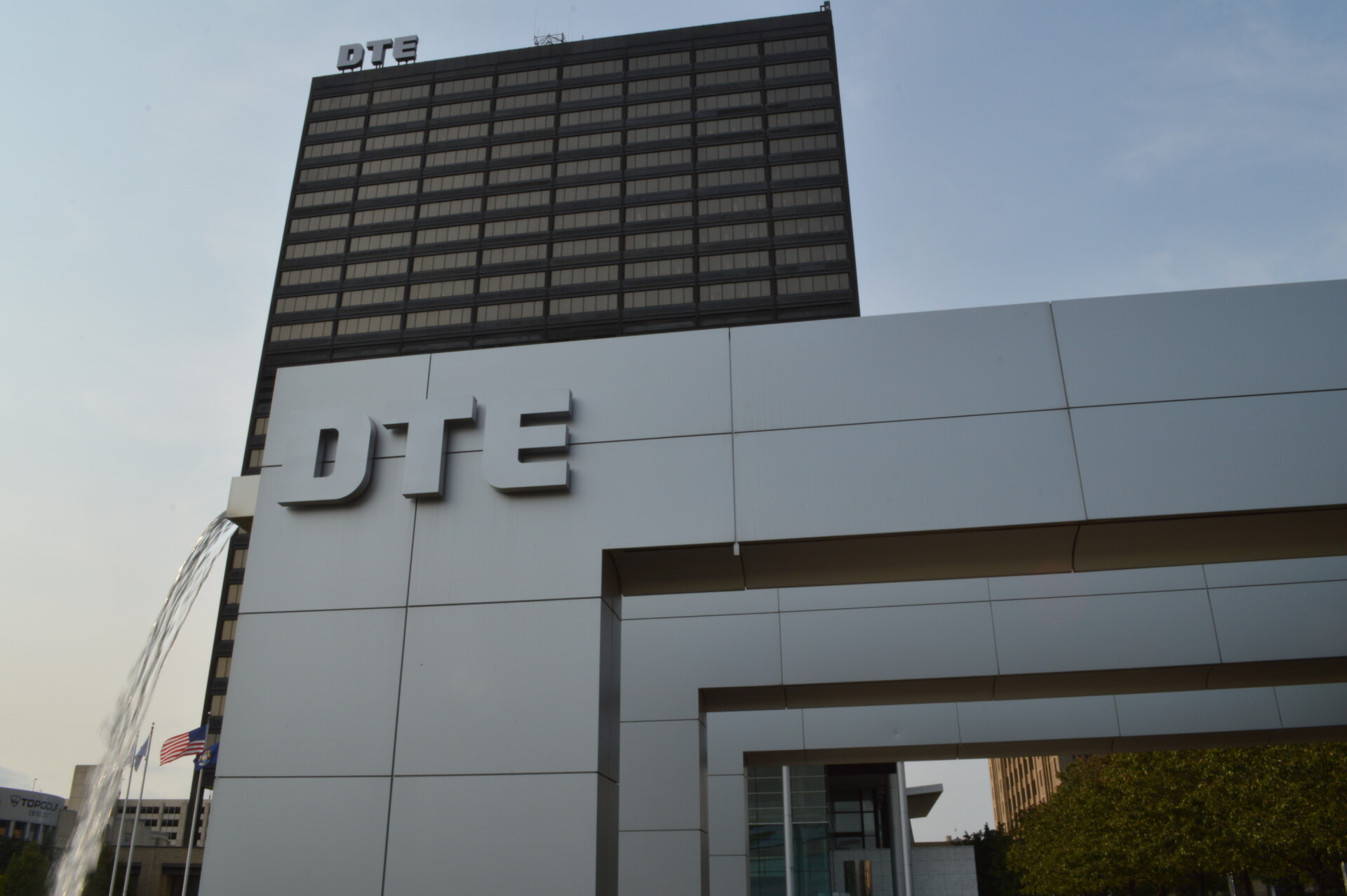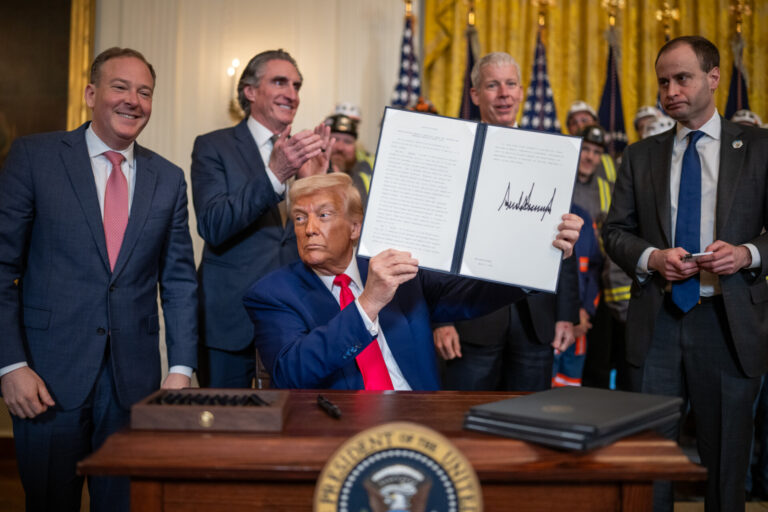DTE dark money ties revealed in criminal court filings

DTE Energy employees directed the transfer of money from one dark money nonprofit to another tied to a Michigan official, recent criminal court filings show, contradicting years of the utility denying or downplaying its involvement in secretive political giving.
The filings represent the most definitive evidence yet suggesting DTE employees have controlled the activities of Michigan Energy First (MEF), a 501(c)(4) nonprofit that over more than a decade has channeled millions of dollars into other dark money funds and efforts to sway Michigan elections and policy. While DTE employees sit on MEF’s board, the utility has long implied a separation between the two – including when asked about the very same donation flagged in the recent court documents.
Court records show that the chief of staff in DTE’s corporate and government affairs division, Pam Headley, in 2020 facilitated a $100,000 donation from MEF to Michigan Citizens for Fiscal Responsibility (MCFR), a dark money group helmed by then-Republican Senator Mike Shirkey and Republican political operative Heather Lombardini. MCFR sought to end pandemic emergency restrictions. Headley has no known public affiliation with MEF and used her DTE email to communicate with MCFR officials, sometimes during business hours. Messages included the subject line “RE: Contribution from Michigan Energy First”.
Headley’s emails came to light as part of an ongoing criminal proceeding stemming from Lombardini’s alleged failure to file required MCFR campaign finance disclosures in a broader dark money scheme. The messages contrast sharply with DTE’s earlier public denials.
After rumors of DTE’s financial ties to MCFR and the affiliated Unlock Michigan campaign first bubbled up in 2020, the utility told a Planet Detroit reporter that “DTE unequivocally is not financially supporting the Unlock Michigan/MI Citizens For Fiscal Responsibility campaign.” Even after a later tax filing confirmed MEF’s six-figure contribution, DTE spokesman Peter Ternes doubled down, telling the Guardian that DTE “unequivocally” did not make the donation and “[does] not speak” for MEF.
But Headley used her DTE email to confirm MEF’s contribution to MCFR and to manage the logistics of the fund transfer. The emails suggest Headley was familiar with the MCFR leaders, Shirkey and Lombardini.
“As always, thanks for your help,” Headley closed one of her emails to the pair. “Have a wonderful weekend!”
The Energy and Policy Institute sent a series of specific questions to DTE about its relationship to MEF, the dark money group’s support of MCFR, and whether the salaries of Headley and another DTE employee involved in MEF’s donation activity were paid by DTE customers. DTE spokesperson Jill Wilmot responded with a brief statement that largely did not answer the questions and focused on DTE’s campaign giving through its political action committee (PAC), which is separate from dark money accounts. The questions and DTE’s statement are published in full at the bottom of this article.
Dark money group funded by DTE, run by utility lobbyists
Even before revelations in the recent court filings, the boundary between DTE and MEF appeared porous at best. For MEF’s entire existence, DTE executives and lobbyists have comprised a majority of its board. DTE recently confirmed longstanding suspicions that it had contributed to MEF, but did not disclose when and how much. (Since 2014, the dark money nonprofit has reported having received over $51 million in contributions but is not required to publicly list its donors.)
Yet utility representatives have repeatedly told reporters that DTE does not speak for MEF. The utility reiterated that statement in a response to questions from the Energy and Policy Institute.
“While DTE has contributed to Michigan Energy First (MEF) in the past, we can’t speak on behalf of MEF or the contributions the organization makes,” Wilmot said.
But at the time of its 2020 donation to MCFR, the MEF board president was Renze Hoeksema, who spent decades as a DTE lobbyist before he retired in 2022. In one email unearthed in the criminal court filings, Headley notes that Hoeksema instructed her – a DTE employee, with no known role with MEF – to manage the MCFR contribution.
“Renze asked me to let you know that today the Michigan Energy First Board approved a $100,000 contribution to Michigan Citizens for Fiscal Responsibility,” Headley wrote. “In order to process this contribution they have requested some additional information,” she continued, with a request for an invoice and signed letter. Headley offered her help with any questions, and closed out the email with her DTE email signature.
Transcripts from the criminal proceeding also show Lombardini referred to the MEF money as a donation from DTE. Lombardini emailed Shirkey on July 15, 2020: “I think I’m getting the $100,000 tomorrow from DTE.” The next day, Lombardini tells Shirkey: “Unlock Michigan update: $100,000 DTE check arrived today.”
DTE deception mirrors high-profile utility fraud
Its most recent available tax filing, for 2023, describes MEF’s mission to “educate legislators & the general public on the issues facing Michigan, & to advocate citizen participation & obtain grassroots support.” But for years, it has been part of a utility dark money network known as a powerful – and bruising – political force in Lansing.
Former Republican Michigan State Representative Gary Glenn, a vocal critic of monopoly utilities who served as chair of the House Energy Committee, blamed his loss of a state senate seat on $1 million in utility dark money deployed against him. Conversely, MEF has buoyed more sympathetic lawmakers with big-ticket donations to their nonprofits. By setting up secret 501(c)(4) accounts of their own, elected officials can skirt campaign contribution limits and conceal their benefactors.
Reporting by the Detroit News has exposed widespread dark money activity among Michigan elected officials, including influential leaders in both parties – among them, Governor Gretchen Whitmer.
While utility dark money activity is pervasive in Michigan, it is not unique to the state.
Another Midwest utility, FirstEnergy in Ohio, used dark money to orchestrate a massive bribery scheme that lined the pockets of a top lawmaker who pushed a billion-dollar bailout for failing nuclear and coal plants, then-Speaker of the Ohio House Larry Householder.
In that scheme, FirstEnergy secretly paid nearly $60 million into a dark money 501(c)(4) nonprofit controlled by Householder. Investigators exposed the scheme, ultimately leading to federal indictments and convictions.
Additionally, the U.S. Securities and Exchange Commission charged FirstEnergy and its former CEO Charles Jones with fraud, in part because the utility “failed to disclose material related party transactions with respect to payments FirstEnergy made to a 501(c)(4) organization funded and controlled in part by certain former FirstEnergy executives.”
Another Ohio utility, American Electric Power, was similarly penalized by federal regulators over its failure to disclose to shareholders payments made to a dark money group formed to bankroll Householder and support his extended tenure as Ohio House Speaker. The fraud charge resulted in a $19 million civil penalty for the utility. Nicholas Akins, who was CEO of American Electric Power while the dark money changed hands, currently sits on DTE’s board.
DTE has acknowledged funding MEF, which in turn has funneled cash to other dark-money nonprofits linked to elected officials. But in a comprehensive search of DTE securities filings, the Energy and Policy Institute did not find a single instance where DTE mentioned Michigan Energy First, explained its affiliation, or noted its contributions to the dark money nonprofit. DTE did not respond to a question from the Energy and Policy Institute asking if it could identify any securities filings that refer to MEF.
Dark money a pervasive undercurrent in Lansing
In addition to its donations to nonprofits tied to individual elected officials, MEF has made hefty contributions to general party funds that support both Republicans and Democrats. MEF board member Eric Doster – an attorney linked in state records to dozens of political and 501(c)(4) groups in Michigan – previously told the Detroit News that MEF has disbursed donations in a “deliberately non- and bipartisan manner” over “many years.”
Although the MCFR donation that recently surfaced in the ongoing criminal case was a direct attack on Whitmer’s power and policymaking, she has lately emerged as a key beneficiary of MEF giving – especially after her Democratic party swept state elections in 2022, with plans to overhaul energy laws. MEF pumped $2 million into Democrat-affiliated accounts that year, including $1.1 million to the Michigan Democratic Party’s 21st Century Fund and $750,000 to the Whitmer-affiliated 501(c)(4) Road to Michigan’s Future. The latter was MEF’s largest-ever donation to a nonprofit linked to a single officeholder, according to the Detroit News.
Then in 2023, when a widespread push for utility accountability sputtered amid inaction from the Democratic-controlled legislature, MEF sent $100,000 to yet another 501(c)(4) – this one tied to then-House Speaker Joe Tate. Environmental advocates criticized lawmakers for watering down key bills as they took DTE money.
“This entire process has really been co-opted by utilities,” Christy McGillivray, political and legislative director for Sierra Club Michigan, said at the time. “We have a really serious secret money problem in Michigan politics.”
Frustration over DTE’s political spending in Michigan spawned a legislative push in 2024 to restrict campaign contributions from monopoly utilities. A bipartisan coalition revived the popular effort this year, as proponents accused utilities of “buying outcomes.”
Dark money reforms long sought in Michigan
Michigan Attorney General Dana Nessel has repeatedly raised utility dark money spending as a problem in Michigan politics, calling for more expansive required disclosures to help the public track how much utilities are funneling to dark money groups like MEF. It’s Nessel’s office that brought criminal charges in the ongoing case that exposed the emails where DTE staff coordinated donations by MEF.
In 2023, Nessel urged the Michigan Public Service Commission to require more transparent reporting by utilities of their political spending, including their use of dark money. Regulators ultimately adopted a version of Nessel’s proposal that requires DTE to submit an annual filing that lists any corporate contributions over $5,000 made to nonprofits – including 501(c)(4) dark money groups – during the prior year. DTE made a public disclosure in fall 2024, covering its spending since September 2023.
But while the disclosures provide a long-sought boost in transparency, they do not capture the scope of the dark money machinations that preceded them – or tell how much money DTE parked in or routed through MEF in prior years. DTE reporting to date indicates that the utility has not given more than $5,000 to MEF since September 2023, after new requirement took effect. Meanwhile, MEF’s most recent tax filing shows a fund balance of more than $7.6 million. It is not known how much of that total, and how much of the $51 million that MEF has raked in since 2014, came from DTE.
Months before the PSC added its disclosure requirement, a group of DTE shareholders proposed a resolution that would have required the utility to detail dark money spending, including corporate cash funneled into 501(c)(4) nonprofits. Utility leadership opposed the proposal, which specifically called out MEF and noted that DTE “critically fails to disclose its payments” to such groups. Shareholders ultimately followed DTE’s guidance to vote down the measure.
DTE Foundation head included on dark money emails
Recent court records show that copied on Headley’s emails confirming MEF’s donation to MCFR is another DTE employee using a company email address: Rodney Cole.
At the time of the 2020 email exchange that appears in court records, Cole was director of state government affairs – a top lobbying role in which he “spearheaded state legislative activities and worked closely with state legislators and the governor’s administration to meet the needs of DTE’s customers and other stakeholders.” DTE did not respond to a question from the Energy and Policy Institute about whether DTE customers paid for Cole’s salary in 2020, when he was copied on emails related to the MCFR donation.
The next year, Cole took on a leadership role within the DTE Energy Foundation, which facilitates the utility’s charitable giving.
The DTE foundation doles out tens of millions of dollars in grants annually to community organizations including, for example, those affiliated with prominent and influential community leaders. DTE’s charitable giving has over the years appeared political in nature: grant recipients have shown up in regulatory proceedings, public hearings, and the media to advocate for DTE’s preferred policy positions. Leveraging charitable giving to promote the utility agenda appears in a ”tactical guide” from the Edison Electric Institute, the trade association for electric utilities.
Questions the Energy and Policy Institute submitted to DTE
1. DTE representatives have said that the utility does not speak for Michigan Energy First. Does DTE stand by these previous statements?
2. DTE representatives also said “DTE unequivocally is not financially supporting the Unlock Michigan/MI Citizens For Fiscal Responsibility campaign.” Does DTE stand by that statement?
3. What is the total amount of corporate money that DTE has contributed to Michigan Energy First since the 501(c)(4)’s inception?
4. Have DTE shareholders ever been informed of the corporation’s contributions to Michigan Energy First? If so, please direct me to the SEC filing(s) in which Michigan Energy First is referenced.
5. Was any portion of Pam Headley’s salary charged to ratepayers in 2020? If so, what percentage?
6. Was any portion of Rodney Cole’s salary charged to ratepayers in 2020? If so, what percentage?
DTE’s response to the questions
“DTE Energy is committed to being a responsible corporate citizen and complies with all applicable laws regarding corporate donations and political contributions. These disclosures showcase DTE’s commitment to our customers and communities we serve, helping us meet our aspiration of being best in the world and best for the world. The political contributions the company makes are supported by the DTE voluntary employee PAC or DTE shareholders – not from customer revenue.
While DTE has contributed to Michigan Energy First (MEF) in the past, we can’t speak on behalf of MEF or the contributions the organization makes.”



